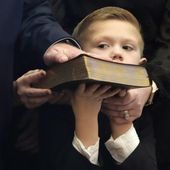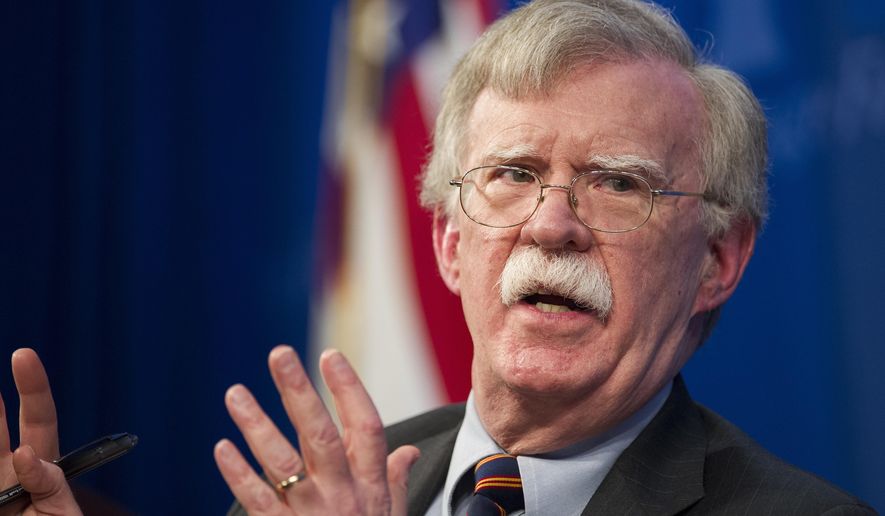U.S. allies and enemies served up a range of reactions Wednesday to the ouster of hawkish National Security Adviser John R. Bolton, while intense speculation mounted over President Trump’s pick to replace him.
Iran and Israel shared a rare moment of agreement, with Tehran fearing and Jerusalem hoping that the U.S. “maximum pressure” campaign on Iran is unlikely to soften with Mr. Bolton’s departure.
“I have no doubts at all that, in any situation … President Trump and his administration will be very, very tough with Iran,” Israeli Prime Minister Benjamin Netanyahu said in a television interview, citing U.S. sanctions announced against Tehran on Tuesday, just after Mr. Trump declared he had fired Mr. Bolton.
With Mr. Trump telling reporters he already has a list of five possible candidates and will decide next week, world leaders watched closely for signs of whether the pick will be someone with less of a hard-liner bent toward adversaries such as North Korea and Iran.
Mr. Trump and Secretary of State Mike Pompeo are the ones who “crafted the American policy” toward Iran, Mr. Netanyahu said.
But there was renewed speculation that the departure of Mr. Bolton, long an advocate for regime change in Tehran, could pave the way for a meeting between Mr. Trump and Iranian President Hassan Rouhani on the sidelines of the U.N. General Assembly session this month.
SEE ALSO: Iran says John Bolton’s firing likely won’t ease tensions with Donald Trump
In Iran, Mr. Rouhani said the Trump administration “should understand that warmongering and warmongers have no benefit and the warmongers should be set aside,” according to Iranian state media reports.
Abbas Ali Kadkhodaei, a spokesman for Iranian Supreme Leader Ayatollah Ali Khamenei’s Guardian Council, said Mr. Bolton’s ouster would not ease tensions. “The U.S. hostile and arrogant policies do not change by one person’s dismissal,” he said.
“John Bolton’s ouster shows [the] failure of Trump’s policy of pressure and admission of the fact that warmonger Bolton had closed his eyes on realities,” he tweeted.
Mr. Trump, who has Mr. Bolton’s deputy, Charles Kupperman, filling in as interim national security adviser, has not revealed who may be on the short list as a permanent replacement.
North Korean policy
North Korea may be the one aspect of Mr. Trump’s foreign policy most affected by Mr. Bolton’s departure.
The president told reporters that Mr. Bolton “wasn’t in line” with his precedent-shattering personal diplomacy with North Korean leader Kim Jong-un and said Pyongyang was rightly angered when Mr. Bolton in April 2018 floated the “Libya model” for ending the North’s nuclear and missile programs in the run-up to Mr. Trump’s first summit with Mr. Kim in Singapore.
Libyan dictator Moammar Gadhafi lost first his power and then his life in a coup after agreeing to give up his nuclear programs in exchange for economic relief in a 2004 deal with the U.S. and Britain.
“He talked about the Libyan model for Kim Jong-un,” Mr. Trump said. “That was not a good statement to make. You just take a look at what happened with Gadhafi. That was not a good statement to make. And it set us back.”
Although there was no official reaction on the tightly controlled North Korean state press, the Kim regime “must be thrilled at the firing of John Bolton,” said Srinivasan Sitaraman, a North Korea analyst at Clark University in Massachusetts. “Kim resented Bolton’s maximalist positions on nuclear negotiations and his use of the ‘Libyan model’ as an analogy.
“Kim [also] heaped ire on Bolton and partly held him responsible for torpedoing the Hanoi summit,” Mr. Sitaraman said. “Now that Bolton is out of the way and as the U.N. General Assembly gets underway next week in New York, there is no one to stop Mr. Trump from making a deal with North Korea.”
“North Korea will apparently welcome Trump’s ouster of Bolton, as the hawkish figure has long been seen as a thorn in its side from the North’s viewpoint,” Park Won-gon, a professor of international relations at Handong Global University, told the Seoul-based Korean Times. “This is a positive sign in terms of resuming the nuclear talks between Washington and Pyongyang.”
But Mr. Park warned that Mr. Bolton at times provided useful reality checks on his boss’ desire to cut a deal with the North.
While not remarking on the change in Washington, North Korea did reveal Wednesday that it had tested a “super-large” multiple rocket launcher a day earlier. South Korea’s military said the North had fired two short-range projectiles eastward from its western region.
Diplomatic opening
In Europe, some saw an opening for an improved tone in diplomacy with Washington now that Mr. Bolton is gone.
“It is an opportunity, not least for the trans-Atlantic relationship,” Norbert Roettgen, chairman of the foreign policy commission of the German parliament and a senior lawmaker from Chancellor Angela Merkel’s Christian Democratic Union party, told France24.
Mr. Bolton was also a noted skeptic of Russia, but Deputy Russian Foreign Minister Sergei Ryabkov told the Novosti news agency that he had “no expectation” that relations with the U.S. would alter anytime soon.
But Mr. Bolton was a strong backer of Mr. Trump’s decision to renounce the Cold War-era Intermediate-Range Nuclear Forces Treaty with Russia and a skeptic of Mr. Trump’s desire to welcome Russia back into the Group of Seven leading industrial nations, and some in Russia saw his departure as a positive development.
Mr. Bolton “always opposed agreements on strategic stability and arms control, believing that they unnecessarily limit the U.S. and prevent them from demonstrating their superiority,” Sen. Konstantin Kosachev, chairman of the Federation Council’s Committee on Foreign Affairs, told The Moscow Times. “I don’t know if Trump fired Bolton for this reason, but it’s for this reason that I’m definitely not going to grieve about his dismissal.”
Mr. Bolton was also a visible advocate for regime change in Venezuela. He strongly supported opposition leader Juan Guaido’s challenge to socialist President Nicolas Maduro.
Mr. Trump was reportedly frustrated that Mr. Bolton’s argument that the Maduro government — still clinging to power in Caracas — would topple quickly in the face of U.S. sanctions and an oil embargo.
“I disagreed with John Bolton on his attitudes on Venezuela,” Mr. Trump said Wednesday. “I thought he was way out of line, and I think I’ve proven to be right.”
Mr. Maduro has been quiet so far, but a senior official in the Maduro government expressed delight over Mr. Bolton’s ouster.
“On days like this, the Comandante would treat himself to some sweet papaya,” the unidentified official told The Associated Press — a reference to the late anti-U.S. populist President Hugo Chavez’s fondness for a traditional Venezuelan dessert.
But as with many other issues, Mr. Bolton’s departure leaves major questions on where U.S. policy on Venezuela goes from here.
“Maduro is likely thinking ‘good riddance’ and that this is sweet revenge for all the macho posturing,” said Chris Sabatini, senior fellow for Latin America at Chatham House in London. “But that would be a mistake. Bolton’s strategy was flawed from the beginning, and his departure may pave the way to bring in a more professional, effective diplomat that could be a greater threat to Maduro’s autocracy.”
⦁ Tom Howell contributed to this article, which is based in part on wire service reports.
• Guy Taylor can be reached at gtaylor@washingtontimes.com.




Please read our comment policy before commenting.